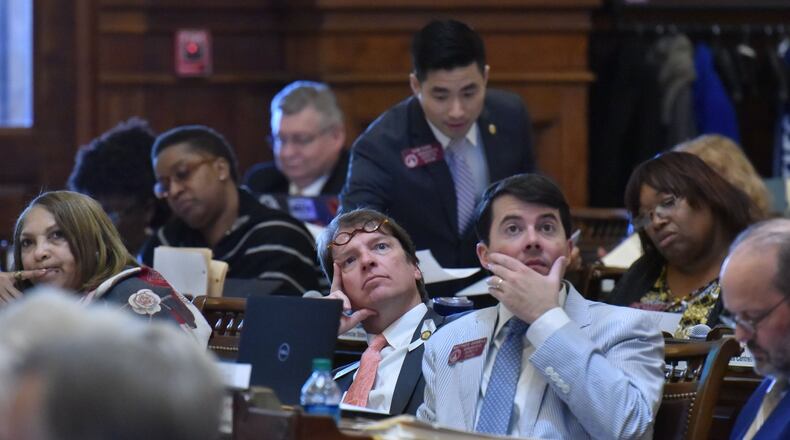Georgia lawmakers left town having voted to approve $3,000 teacher pay raises, ban most abortions, agree to a new voting system and expand access to medical marijuana, but they put off a host of other major issues that will be back before them when they reconvene in January.
The General Assembly adjourned around midnight Tuesday with a hefty plate of leftovers to be rewarmed when it returns in 2020. They include legislation on casinos, hate crimes, tax breaks for airlines, private school vouchers, taxes for Uber and Lyft riders, rural transit and oversight of Hartsfield-Jackson International Airport.
Almost every state leader, from Gov. Brian Kemp on down, left the Capitol with at least a few things he or she would have liked to have gotten done but didn’t.
“I think there are a couple of things we are going to continue to work on,” Lt. Gov. Geoff Duncan said Wednesday, about 12 hours after the final gavel fell on the 2019 session.
Planes, transit and Delta
Probably the biggest last-night swing and miss by lawmakers was the combination of bills that, together at some points, separately at other times, would have suspended the state jet-fuel tax on air carriers such as Delta Air Lines for 20 years, taxed ride-share services such as Uber and Lyft, created a rural transit system, and either took over or created an oversight authority for Hartsfield-Jackson.
At times it seemed as if half of the contract lobbyists at the Capitol were working on those issues, and the tide shifted most of Tuesday. In the end, the package of bills collapsed because parts were supported and opposed by the House, and parts were supported and opposed by the Senate.
But they couldn’t agree on which parts to approve.
The airport takeover was a Senate priority; the House wouldn't go for it and offered a state oversight authority with limited powers.
The tax break on jet fuel — which would save Delta and other airlines about $40 million a year — was a priority of Kemp and the House. Senators weren't interested in renewing a tax break Delta has had off and on for more than a decade, and instead it wanted to tax airlines to raise money to improve small-town airports across the state.
The rural transit legislation was a House priority — it included a 50-cents-per-ride fee on Uber and Lyft customers — but stalled in the Senate, in part over who would govern the new system.
A separate bill would have set up a mechanism to collect sales taxes from Uber and Lyft riders — another House priority — but that, too, died.
“The ultimate legislation that showed up had so many competing ideas on it,” Duncan said. “There were too many big ideas wrapped up into one piece of legislation.
“My assumption is they will be back in front of us again (next year).”
One of the negotiators on the bill Tuesday, state Sen. Steve Gooch, R-Dahlonega, said the transit measure was a complicated piece of legislation, and that the House introduced it too late in the session for senators to adequately digest it.
“We don’t think it’s been properly vetted,” he said.
The transit bill was filed with about a month left in the session, and lawmakers sometimes pass legislation a week after it’s been filed. Nonetheless, the House’s and Senate’s decisions mean it will be reviewed over the summer.
Of fees, hate, guns
Another House measure that routinely passes the chamber but never makes it to the finish line is a proposed constitutional amendment to allow lawmakers to dedicate fees to certain priorities.
For decades the state has collected a fee on used tires and garbage hauled to landfills to pay for dump cleanups. However, tens of millions of dollars have been legally diverted because the state constitution doesn’t allow legislators to formally dedicate fee money.
The House wants to ask voters in 2020 to allow them to dedicate fees for a certain purpose, but after the Senate — which has opposed the idea in the past — approved a more narrow version of the measure, it died for the session.
Some issues appeared to be gaining steam early in the session only to sputter out Tuesday.
Legislation to impose penalties on people who commit hate crimes received a standing ovation when it cleared the House earlier in the session, but it never got a Senate hearing. Senate Judiciary Chairman Jesse Stone, R-Waynesboro, said he wasn't convinced the additional penalties were warranted and said his chamber needed more time to consider House Bill 426, even though it's legislation that has been filed several times.
An effort to expand the use of silencers while hunting died in the final minutes of the legislative session when a compromise committee stripped the language from Senate Bill 72.
The legislation would have allowed a hunter on private property to use a silencer without obtaining permission. State law requires that hunters get permission from property owners when using silencers on their weapons.
A proposal to allow state money to be used for private school tuition died in the Senate but resurfaced late in the session, only to make no progress on the final day.
Other major issues likely to come back before lawmakers in January died earlier in the session. They include legislation that would effectively ban the booting of vehicles parked on private property, an effort to bar domestic abusers from owning guns, a measure that would create a law limiting the government’s ability to pass laws that conflict with religious beliefs, and another that would establish a tax on video streaming, e-books and music downloads.
Stay on top of what’s happening in Georgia government and politics at www.ajc.com/politics.






